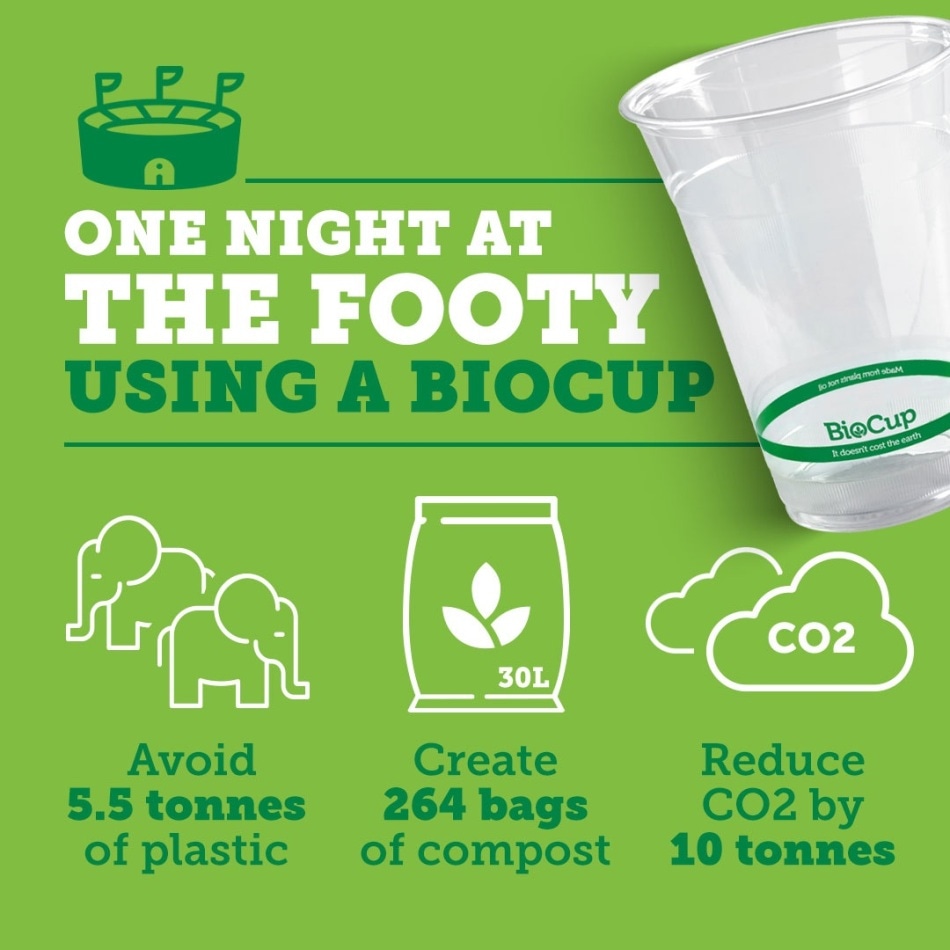Aug 10 2018
Tuesday night’s War on Waste episode broadcast by the ABC featured BioPak compostable bioplastic BioCups as a solution Kiama High School canteen are implementing to divert waste from landfill, and avoiding the use of conventional plastic. What if more institutions switched from conventional plastic cups to compostable bioplastic cups?

Some alarming stats on Australia’s plastic addiction:
More alarming details are reported in The New Plastics Economy: Rethinking the Future of Plastics, a report written by Project MainStream, launched in 2014 by the World Economic Forum and the Ellen MacArthur Foundation, with McKinsey & Company as knowledge partner. Among the more notable points are the following:
- Today, 95% of plastic packaging material value, or $80 billion to $120 billion annually, is lost to the economy after a short first use.
- An overwhelming 72% of plastic packaging is not recovered at all: 40% is landfilled, and 32% leaks out of the collection system—that is, either it is not collected at all, or it is collected but then illegally dumped or mismanaged.
- Without significant action, there may be more plastic than fish in the ocean, by weight, by 2050. Even by 2025, the ratio of plastic to fish in the ocean is expected to be one to three, with plastic in the ocean forecast to grow to 250 million tonnes.
In this week’s episode, Reucassel investigated organics waste collection as a viable solution for diverting waste from landfill, reducing methane gas emissions, recovering resources to generate economic value, and creating jobs. Composting is essential to winning the war on waste – and it isn’t just good for the environment it’s good for the economy, too.
The episode highlighted Kiama High School’s efforts to reduce waste by introducing BioPak compostable packaging as a more sustainable option for single-use disposables in the school canteen. Reucassel shows a BioCup (plant-based bioplastic cup) which can be thrown in the compost with other food scraps and organic waste.
We believe compostable foodservice packaging is part of the solution. But not all councils offer commercial composting so, we launched the BioPak Compost Service – to ensure our cups and takeaway packaging, along with food scraps and organic waste, are diverted from landfill to commercial composting facilities.
The service is available in 9 major cities in Australia and New Zealand and diverted 90 tonnes of waste from landfill in six months. Creating 63 tonnes of compost, that’s 4,316 x 30 litre bags of compost.
It also prevents 167 tonnes of carbon emissions from being created. That’s equivalent to the emissions generated from driving a car around the world 17 times!
War On Waste has always encouraged Australians to be conscious of their consumption habits and take matters into their own hands, rather than rely on governments to clean up our act. In a recent War On Waste Q and A episode, Host Craig Recaussel said ‘I think it's a bit hypocritical to kind of go, “Government, you sort it out. I won't change until you do it”’.
While public policymakers are still trying to assess what’s wrong with recycling programs, large corporations and small entrepreneurs alike are in the best position to take the lead. The BioPak Compost Service is an example of taking matters into our own hands and proving the model can scale. In the first six months since launch, the service has been rolled out across 1,300 suburbs in 9 major cities in Australia and New Zealand and diverted 90 tonnes of waste from landfill in six months.
So what are the benefits of composting, exactly?
- BioPak
- cups and takeaway packaging can be composted along with food scraps – all in one bin, no separation required
- Switching
- to composting also saves on your general waste bills – cheaper than the landfill levy
- Diverts
- organic waste from landfill and eliminate the associated methane emissions
- Composting
- supports the circular economy – it returns nutrients to the soil
- Compost
- doesn’t just benefit the environment, our farmers need high-quality compost to grow our food locally – it reduces the need for synthetic fertilizers and improves the quality of the soil
- BioPak
- compostable packaging is made from rapidly renewable sustainably sourced materials – it's not derived from finite oil resources like conventional plastic
Assets
Compostable cups video: https://www.youtube.com/watch?v=Qz4AHPlbF_E